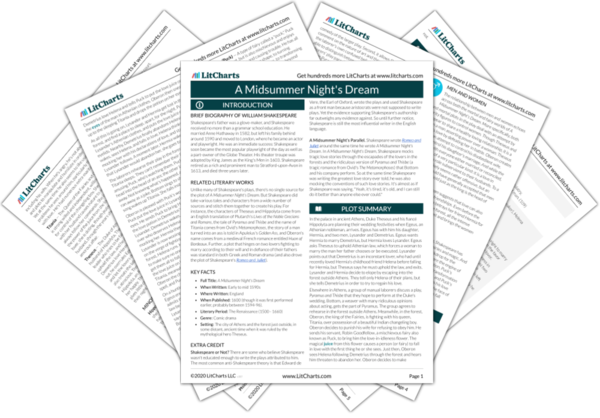Summary
Analysis
Elsewhere in Athens, a group of common laborers including Snug (a joiner), Bottom (a weaver), Flute (a bellows-mender), Snout (a tinker), and Starveling (a tailor) meet at the house of Peter Quince, a carpenter. They are meeting about the play they hope to perform as part of the celebration for Theseus and Hippolyta's wedding: The most lamentable comedy and most cruel death of Pyramus and Thisbe.
With the laborer's and their play, A Midsummer Night's Dream introduces its theme of a play within a play. And just from the title of the play it's clear that the laborers are not destined to be great actors. A lamentable comedy?
Themes
Quiz
Test Yourself
As Quince tries to conduct the meeting, Nick Bottom constantly interrupts with advice. Quince calls out each man's name and his role in the play. Bottom is to play Pyramus. Bottom asks if Pyramus is "a lover or a tyrant" (1.2.21). When Quince says a lover who dies for love, Bottom boasts about the tears he'll draw from the audience, though he adds he'd be even better as a tyrant.
Bottom's constant interruptions show both that he considers himself an authority on the theater and that in this estimation of himself he's very, very wrong. Note also that this play about lovers dying for love is almost identical to the situation faced by Lysander and Hermia.
Themes
Literary Devices
Quiz
Test Yourself
Quince continues to call out names and roles. Flute is slated to play the part of Thisbe, but Flute doesn't want to play a woman's part because he has a beard growing. Quince decides that Flute will play the role in a mask. Bottom again interrupts, asking to be allowed to play Thisbe as well as Pyramus, and showing how he can speak like a woman. Quince says no.
Flute's dilemma about his beard interfering with his ability to play a woman mocks the Elizabethan rule that only men could be actors, meaning that all women's roles were also played by men. Bottom continues to want to be the center of attention.
Themes
Quiz
Test Yourself
Quince continues handing out parts. Starveling: Thisbe's mother. Snout: Thisbe's father. When Quince announces Snug will be the lion, Bottom begs to be allowed to play the lion. He brags about how loud he'll roar. After Quince objects that he might scare the ladies and get them all hanged, Bottom promises to roar as gently as a dove or nightingale. Quince again says Bottom can only play Pyramus, at which Bottom goes into extended thought about what color beard he should wear.
Beyond the fact that roaring as gently as a nightingale is a funny idea, the laborer's misunderstanding about theater is important. They seem to think that the audience can't distinguish between fiction and reality. Through this mistake, they point out how crucial the audience's willing suspension of disbelief is to a play.
Themes
Quiz
Test Yourself
Get the entire Midsummer LitChart as a printable PDF.

To ensure privacy, Quince asks them all to meet him in the forest near the palace that night. There, they will rehearse.












